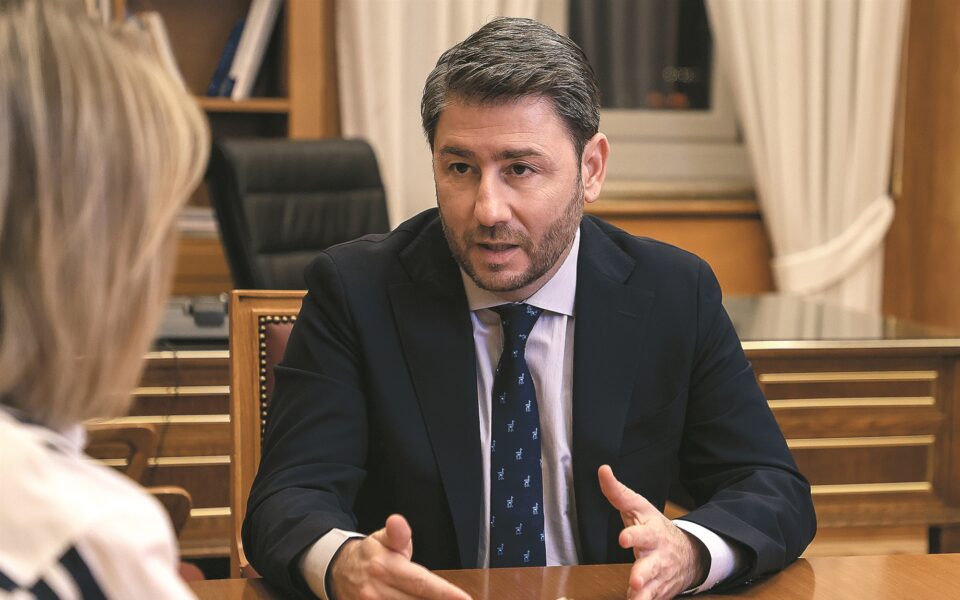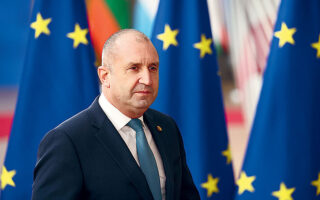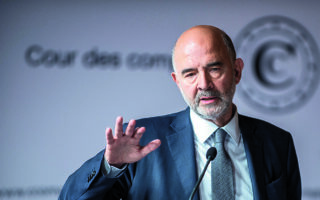PASOK chief chides ND, SYRIZA for past failures
Socialist leader lays out his conditions for a possible coalition government, talks about the wiretaps and presents the socialist party’s agenda

PASOK will only help ruling New Democracy or main opposition SYRIZA form a government in the event of an inconclusive election result if it has a strong enough voice to pass its policy priorities and the potential coalition can agree on a leader who can express the “necessary political change,” socialist party chief Nikos Androulakis told Kathimerini on Sunday. Androulakis said that Greece cannot move forward with Kyriakos Mitsotakis or Alexis Tsipras as prime minister, as both have already had a term in government and “have shown their intentions.”
Androulakis also blamed Mitsotakis for the wiretapping of his telephone by National Intelligence Service (EYP), noting that the prime minister had direct control of the agency, while he accused the main opposition of populism.
You have said that your phone was tapped in a bid to blackmail your party. Has anyone tried to blackmail you?
Obviously not, as neither I nor my party would ever tolerate such a thing. But I assume we all understand that I was not being spied on out of mere curiosity; not me or the others – journalists, MEPs, leading figures of the Armed Forces, even government ministers – who were also put under surveillance. The clumsy, contradictory and groundless excuses that they invoked afterwards to cover up the affair are enough to prove their guilt. Besides, didn’t the prime minister himself talk about “dirty networks” [being behind the surveillance]? Wasn’t his nephew forced to resign on grounds of supposed indignation? Wasn’t the core of collaborators who orchestrated EYP’s wiretaps located in the Maximos Mansion [the prime minister’s office]? Wasn’t Kyriakos Mitsotakis himself EYP’s political supervisor? Didn’t they all report to him? Didn’t Mitsotakis change the law twice to prevent surveillance targets from being legally notified? The prime minister’s heavy responsibilities, which he avoids assuming in full, are obvious.
This kind of centralized control should not be allowed in a democracy, because its acts as an incubator for the serpent’s egg. And that is when you truly get “political monstrosities,” not when New Democracy loses its majority in Parliament, as Mitsotakis has threatened [in a speech to his party in November 2022]. This is why I have taken recourse to the Greek and European Courts. This is why I will continue my fight through every suitable parliamentary forum. This is why, at the February 15 meeting of the European Parliament on the matter [the wiretapping scandal and freedom of the press in Greece], all the MEPs stood by my side, except for those who refused [the Conservatives]. Even the petition I have filed since last fall to find out whether the Greek government was violating national and European rules on my immunity with EYP’s monitoring has been maligned.
Why do you think SYRIZA raised the issue of your possible blackmail?
SYRIZA’s hard core cannot let go of populism, proving that the alliance with Panos Kammenos [leader of the Independent Greeks who formed a coalition government with SYRIZA in 2015] was not a coincidence. I don’t think these practices resonate with progressive individuals.
In your opinion, what is at stake in these elections? Is it, as you said last December, an opportunity to send New Democracy back into the opposition?
The opposition is fighting to change the way the country is governed governance for the better and not to keep the same government in power. I have previously emphasized the need for a progressive government, which will not resemble the Tsipras-Kammenos administration. You know, Mitsotakis and Tsipras are trying to associate themselves, respectively, with stability and progress. Both, however, abused the notions while in government. PASOK-Movement for Change (KINAL) is neither trying to keep an equal distance nor is it pretending to be neutral. It is opposed to both main parties and marches on its own path – the path of duty, transparency, respect for democratic principles and institutions, the creation of independent authorities and Diavgeia [the online public registry of activities relating to public procurement established by PASOK and named after the Greek word for “transparency”]. On the opposite side, our political adversaries are competing for who will control the levers of power, manipulate the judiciary, tap the most phones, appoint the most temporary staff, directly award the most procurement contracts. Even in the dark years of the bailout programs, they instrumentalized our bankruptcy by talking about solutions that they knew were unrealistic. By trying to disclaim all responsibility, they have prevented a fair assessment from being made of the reasons why we were led to the brink, placing obstacles on the way out [of the bailouts], which meant that other countries, like Portugal, did a better and faster job than us and at a lower cost to their citizens. So, the stakes at the next election are whether the public will prefer those who are ready to sacrifice everything for the good of all or those who are ready to do everything to be in power.
‘Neither I nor my party would ever tolerate [being blackmailed]. But I assume we all understand that I was not being spied on out of mere curiosity’
Will you insist that neither Mitsotakis nor Tsipras should be prime minister, even if they garner very high percentages in the first or second round of the election?
PASOK-Movement for Change guarantees economic prosperity with social justice. It remains the voice and conscience of the middle class, which is concerned over its position; of wage-earners in cities and in rural parts of the country who are threatened with impoverishment; of the new generation that is at risk of missing the train of the fourth industrial revolution and is marginalized in its own country. PASOK is here to prevent the creation of a new generation of have-nots; to leave no one behind; to reverse demographic aging and social decline; to represent all those who seek to overcome outdated opposition by proposing new alliances [and] credible alternative governance proposals. Tsipras and Mitsotakis each had four years at their disposal to demonstrate their intentions and the result of their policies. The only thing keeping them standing is how they compare to and cancel each other and that, I think, leads nowhere and is destructive. That is why the country cannot turn a page with these two as main players.
Can the system of proportional representation yield a government or are we heading to a two-round election? Under what conditions would PASOK agree to discuss a coalition?
New Democracy has announced that it will drag the country into successive electoral battles. SYRIZA, on the other hand, sets its primacy as a condition [for any coalition], in contravention of the philosophy of proportional representation that it itself established. PASOK, on the contrary, will observe the rules of the Constitution. There is only one condition to enter a debate for a coalition government: to achieve a high enough percentage so that we can impose our policy priorities in a mutually accepted [coalition] program, as is the case in countries with a strong liberal democracy. Otherwise, power for the sake of the power is not the objective. Considering the state our country is in, coalition governments can act as a bulwark against arrogance and regimentation. But this can only happen if there are clear political commitments and individuals who can express the wider political change that our country needs.
Wider consensus
The issue of home foreclosures has become a very heater one following the Supreme Court’s decision allowing funds to carry out foreclosures for homes attached to non-performing loans. Is there any real way to protect these homes or is it all talk since the funds now own those loans?
The quarrel between New Democracy and SYRIZA after the Supreme Court decision was especially galling, I would say, given that Tsipras had promised a partial or total cancellation of debts when SYRIZA was in power but then opened the door to the funds, while the Mitsotakis government eliminated all protection of the main residence. We must give a second dignified chance, with transparent and objective criteria, to those who tried but were not able to pay, and not to strategic defaulters. This is the current situation: The debts of citizens and businesses exceed 270 billion euros and 55,000 foreclosures of primary residences are planned for 2023 alone. The funds buy the loans from the banks at 15%-20% of their value and extort 80%-90% of the loan from citizens. Banks raise mortgage rates but keep deposit rates flat, reaping excess profits. The government must stop treating the interests that profit at the expense of citizens with kid gloves. We insist on protection of the primary residence with an update of PASOK’s 2010 law, the protection of agricultural land and an integrated private debt management framework with a sustainable solution for borrowers in Swiss francs, but also 120 installments for debts to the public tax office and the Single Social Security Entity, and a debt haircut, as long as payments are observed.
You talk about political consensus. On what agenda?
Some of our key priorities, among others, are: Rebuilding the National Health System by cancelling Article 10 of the recent law of the Mitsotakis government, which handed over a public and social service to private business speculation; the creation of a strong primary healthcare network, the lack of which proved disastrous during the [Covid-19] pandemic; good jobs for the new generation with employer contribution subsidy programs for full-time jobs in the private sector, repealing the provisions of New Democracy’s law, which led to employer misconduct, and the reinstatement of collective bargaining; social housing programs, which we were the first to include in the public debate. We are talking about a policy that will reduce the cost of living by creating a pool of over 100,000 homes through new construction but also by providing redevelopment and tax incentives to those who list their properties, so that they can then be rented at affordable prices. We also want to reduce inequalities with permanent substantial interventions and not temporary handouts, with a radical tax reform focused on reducing taxes on wage labor, with a reduction in VAT on basic food items for the duration of the inflation crisis, with a drastic reduction of the unacceptably high threshold of tax-free gift deeds for parents, and with scrapping the one-off taxation of the provocative windfall profits of energy producers and the banks, which took advantage of the crisis.
We have a duty to formulate a new national production model. With a targeted change in the priorities of European resources and especially the EU Regional Development Fund to support domestic production, small- and medium-sized enterprises, the primary sector, a fair green transition, energy democracy and the diffusion of renewable energy sources in production, but also hundreds of energy communities. If the country’s green transition had been carried out when it should have been, we would have saved billions of euros during the [energy] crisis. But SYRIZA and New Democracy prioritized making the country so dependent on imported natural gas that it undermined its energy security and made it vulnerable to geopolitical crises. We will also make “made in Greece” our slogan, to connect the primary sector with manufacturing and tourism.
Can the Greek and European economies really be competitive in the international environment?
In an international environment where the pandemic was followed by an energy crisis that shot up production costs in all sectors of the economy, we must take the necessary measures to protect the competitiveness of Greek and European industry. The United States has announced a program of subsidies and investments worth $730 billion, with $370 billion channeled into actions to limit emissions.
At the recent meeting of the leaders of the Party of European Socialists, I pointed out that it is not right for the European response to be only the relaxation of state aid rules, which can create a huge distortion in the single market. Greece has different capabilities than other countries such as Germany, France and the Netherlands. For this reason, I have called for the creation of a European Sovereignty Fund, which with new resources, based on the experience of the Recovery Fund, will finance the investments needed by the European economy and especially the weaker countries to become more competitive by creating quality jobs. We have a duty to recover and also to maintain part of our production base whose loss to third countries undermines the resilience and self-reliance of the union.




